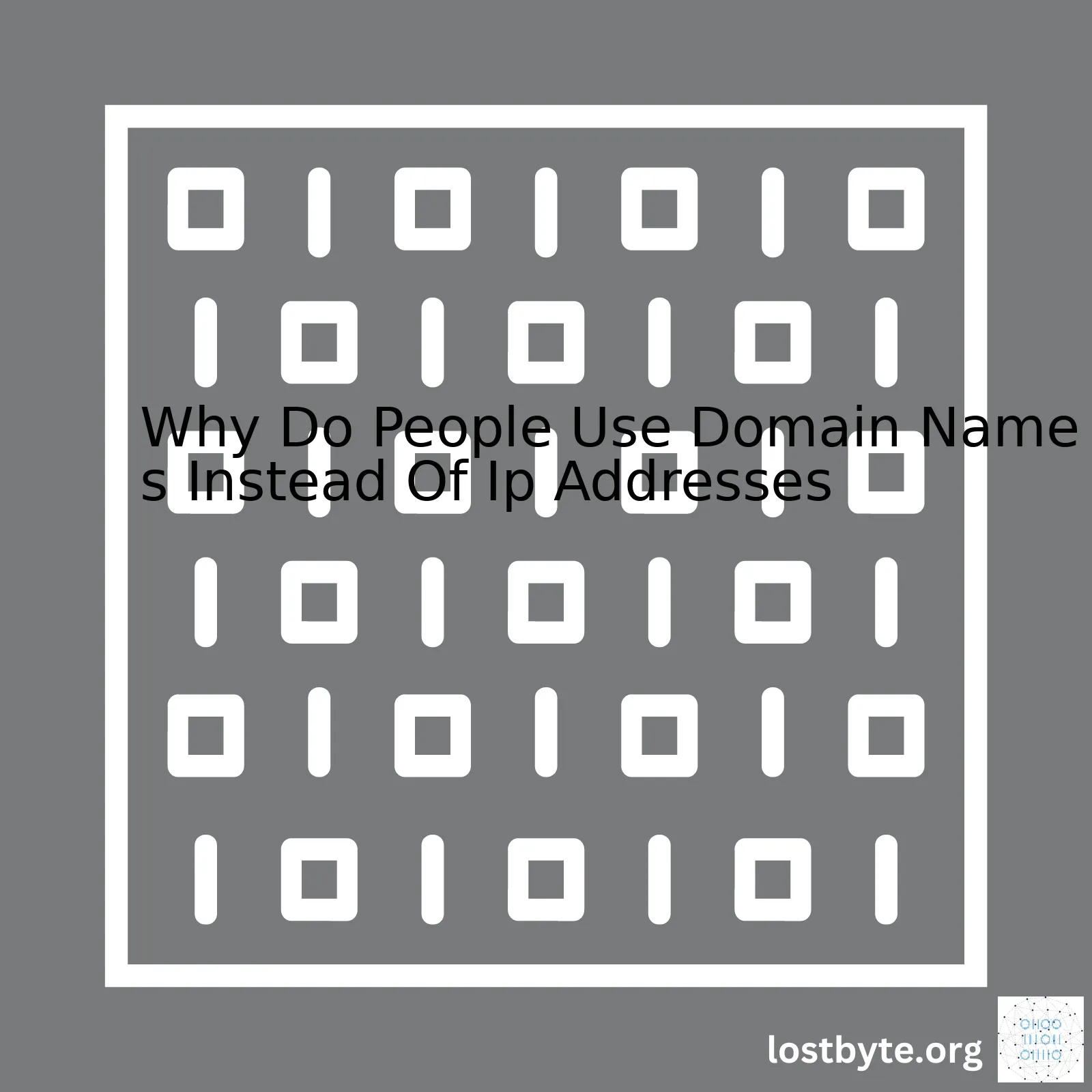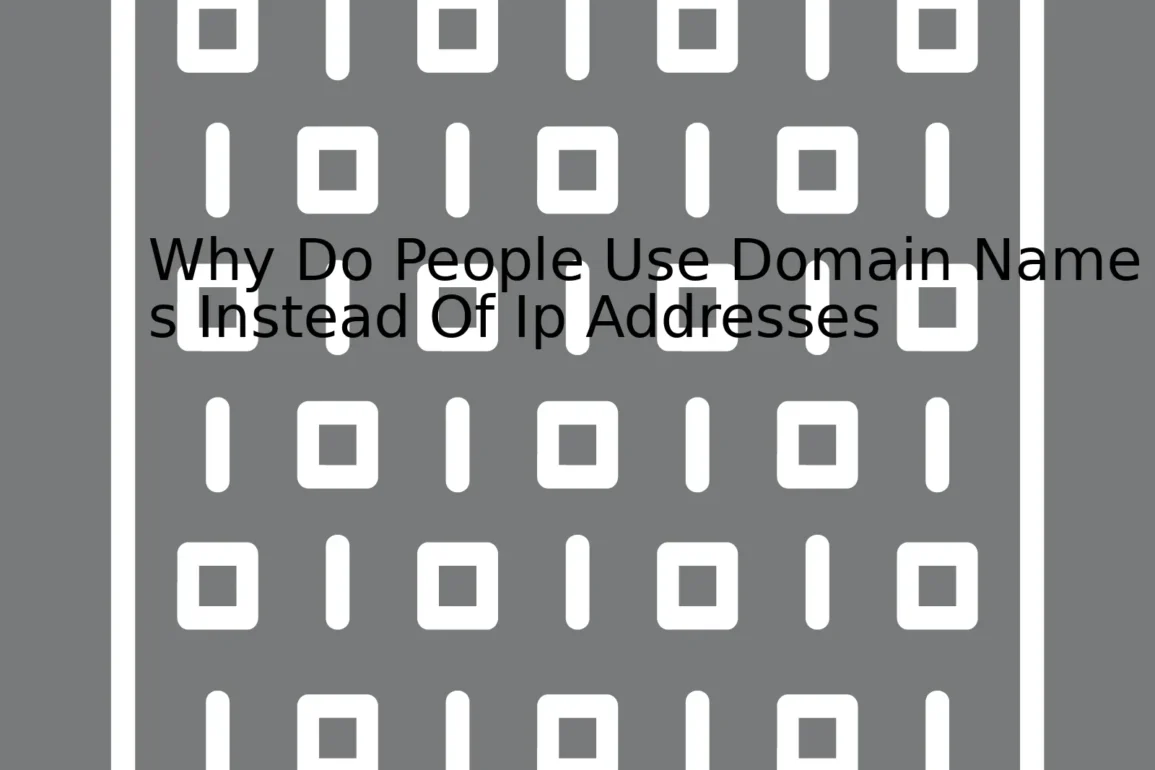
| Aspect | Domain Names | IP Addresses |
|---|---|---|
| Ease of Use | High – easy to remember and type | Low – complex and difficult to remember |
| Branding/Marketing | High – allows for brand recognition and SEO | None – doesn’t offer these benefits |
| Scalability | High – can move servers without changing address | Low – if a site moves to a different server, the IP changes too |
| Privacy and Security | Medium – whois information, but can be hidden | Medium/Low – easily traceable |
The reason why people use domain names instead of IP addresses can be derived from the comparison table above.
Firstly, domain names are simply easier to use than their corresponding IP addresses – they are easier to remember and type because they typically consist of words instead of numerically jagged sequences.
Secondly, domain names give businesses an opportunity for brand recognition and marketing advantages like Search Engine Optimization (SEO)[1]. The business name in the URL helps increase brand visibility while also facilitating better search engine rankings.
Thirdly, using domain names allows for scalability. A website could move its server tomorrow, yet the domain name remains unscathed. In contrast, with an IP address, any move to a new server would necessitate an address change – a complex and tedious procedure.
Finally, domain names offer a medium level of privacy and security. Through Whois information[2], one can access owner details but this can be concealed using services like WhoisGuard. On the contrary, IPs are more straightforward to trace and offer less protection to website owners.
Ultimately, using domain names instead of IP addresses proves to be a practical choice for reasons ranging from user friendliness to branding advantages, as well as scalability and a moderate amount of security and privacy.
References:
[1] – Moz – Domain
[2] – ICANN WHOISDomain names and IP addresses are two fundamental aspects of the internet, seamlessly working together to deliver your favorite content right at your fingertips. If these terms sound unfamiliar, think of it like this: every house has an address, a unique identifier that lets people (and Google Maps) know where you live. Similarly, each website/internet resource has an IP address – a numeric label that identifies its location in the vast web of global networked devices.
IP addresses are often complex, making it challenging for us humans to remember them all. Imagine having to remember ‘192.0.2.1’ instead of ‘www.example.com’. This difference is precisely why we use domain names instead of IP addresses. Here’s a bit more to support this point:
• Memorability
The main reason why domain names exist is due to the human factor. Our brains are wired to remember meaningful words or phrases much easier than a string of numbers. A domain name like ‘www.google.com’ is far more memorable and simple to remember than ‘172.217.10.14’.
• Branding Purposes
Domain names add credibility to your brand or business. It gives an impression of professionalism, plus it’s easier for customers to find and recall your site. Not only that, domain names can include keywords related to your business that can help in SEO (Search Engine Optimization).
• Ease of Transfer
If you ever need to change your website’s hosting service, IP could change based on the new host server’s location. With a domain name, users can still reach your site with the same URL even after the IP changes, ensuring seamless access.
• Structure and Hierarchy
Domain names allow for structure and organization on the internet. They allow for domain extensions (.com, .org, .edu, etc.) that can give information about the type or geographic location of a website. This kind of categorization can’t be managed with IP addresses alone.
Under the hood, when you type a domain name into your browser, something called DNS (Domain Name System) works as a middleman, translating that domain name into an IP address that computers understand.
Consider the following piece of code which represents a very simplistic way of demonstrating how a domain name is resolved to an IP:
import socket
print(socket.gethostbyname('www.google.com'))
This Python code snippet uses the socket library, specifically the gethostbyname function, to return the IP address associated with the domain ‘www.google.com’.
| Domain | IP Address |
|---|---|
| www.example.com | 192.0.2.0 |
| www.randomsite.org | 198.51.100.0 |
Here is a simple table representing how domain names map to their respective IP addresses.
In summary, people prefer to use domain names instead of IP addresses because they are designed to be more relevant, memorable, and easier to use in a digital world teeming with infinite web resources. The convenience of inputting easily-remembered terms to connect with websites worldwide is a major usability feature of the web, and it all ties back to efficient networking basics powered by the likes of Domain Names and IP addresses.
For a deeper dive into the topic, do check out Mozilla Developer Network’s [extensive guide](https://developer.mozilla.org/en-US/docs/Learn/Common_questions/What_is_a_domain_name) on Domain names.
Let’s start by understanding what a domain name is. A domain name is essentially a human-friendly address for a website. Instead of having to remember complex lines of numbers, which are known as Internet Protocol (IP) addresses, users can simply type in a name like “Google.com”. It’s similar to adding a contact in your phone; instead of memorizing their number, you save it under a name.
Practicality and Mindful Consideration:
The main use of domain names is to provide easily recognizable and memorizable names to numerically addressed Internet resources. This tribute allows the internet to be user-friendly while keeping the technologically convoluted details out of sight and mind.
Thinking about it, remembering numeric strings representing IP addresses:
192.30.253.113
(An example of IPv4)
or
2001:0db8:85a3:0000:0000:8a2e:0370:7334
(An example of IPv6)
can be challenging to say the least. Remembering names such as “github.com” is much simpler. It naturally follows that when given the choice between complexity or simplicity, we gravitate toward the latter.
Enable Business Opportunities:
But beyond just practicality, domain names also play a crucial role in branding. They allow organizations to create a virtual identity that represents their physical being on the World Wide Web. An owner of a premium .com domain can appear more professional, and therefore instill a sense of trust among clientele.
An All-Pervasive System:
The DNS (Domain Name System) transforms these easy-to-remember names into their respective IP addresses whenever they’re entered into a web browser.
Consider the following PHP code snippet that demonstrates this:
$ip = gethostbyname('www.example.com');
echo $ip;
This code looks up the IP address for the hostname ‘www.example.com’ and prints it. Even without seeing the output, we understand at a glance that ‘www.example.com’ relates to a specific IP address.
The Significance of Domains:
It’s safe to declare that domain names have revolutionized the way we maneuver around the World Wide Web, making navigation a breeze. We ought to appreciate the role domain names play not only in providing convenience but also their integral contribution to online marketing efforts.
The tables below summarize information about Top-Level-Domains (TLDs):
| gTLD (Generic Top-Level Domains) |
|---|
| .com |
| .org |
| .net |
| .gov |
| .edu |
| ccTLD (Country Code Top-Level Domains) |
|---|
| .us |
| .uk |
| .au |
| .ca |
The simplicity yet sophistication of domain names make them an integral part of how we navigate the digital landscape.
You can read more about the importance of domain names from ICANN’s explanatory guide.The digital realm we operate in today banks heavily on unique identification, where internet protocol (IP) addresses and domain names come into play. While both entity act as identifications for servers or websites, there’s been an ongoing deliberation about the advantage of domain names over IP addresses.
Memorability: Domain Names Vs IP Addresses
Let me walk you through an example. An IP address could look something like this:
192.0.2.1
. Imagine, your favorite shopping website had an IP address instead of a name. Could you recall the preceding string of numbers? In all likelihood, the answer is no. This is the most significant advantage a domain name offers, which is its simplicity and memorability.
A domain name, like
www.yourfavoriteshoppingwebsite.com
, which contains words instead of numerical values, is significantly astonishingly easy to remember. We humans are inherently more adept at remembering names and phrases than a sequence of numbers, making domain names easier to memorize than IP addresses.
The SEO Perspective
When you build a website, ideally, one of the primary goals revolves around driving maximum traffic through search engine optimization(SEO). When it comes to search engine results ranking, domain names have a clear and straightforward advantage over IP addresses. Firstly, a keyword-rich domain name leaves breadcrumbs for search engines, improving your site’s SEO. Secondly, top-level domains(TLD), such as .com, .edu, .org, etc., indicate relevancy, influencing your search engine ranking positively. Replacing a domain name with an IP address can hinder these benefits, affecting a site’s visibility online. Read more about it on this Google SEO guide.
User Convenience and Flexibility
With domain names, changing web hosting providers is a cakewalk. You can move your site to a different server, keeping the domain name intact. Users can continue accessing the site with the same URL, obstructing zero user experience. On the contrary, using an IP address would require updating the numerical value each time you switch servers — quite an inconvenience for users.
The Branding Element of Domain Names
Imagine Facebook running on an IP address! A domain name works like magic when it comes to branding. A company’s brand image, reputation, trustworthiness couched within the letters forming the domain name. An IP address seriously lacks this branding element.
Putting It Together: How DNS Works
Behind the scenes, the Domain Name System (DNS) works to translate domain names into IP addresses, remedying the issue of memorability and usability. Here’s a short code snippet that illustrates the translation from human-readable domain name to machine-friendly IP address:
// Node.js code to resolve a domain name into an IP address
const dns = require('dns');
dns.lookup('www.example.com', (err, address, family) => {
console.log('Address: %j Family: IPv%s', address, family);
});
This operation indicated above, often referred to as “DNS resolution”, bridges the gap between human and machine. It allows us to use easily memorable domain names, while machines and systems on the back-end deal with the complex IP addresses.
Therefore, less complexity, ease of remembrance, SEO benefits, user convenience, flexibility, and enhanced branding opportunities validate why people prefer using domain names over IP addresses.From a developer’s perspective, the incorporation of properly-named domains in websites has a huge impact on fostering trust and credibility among users, over directly using an IP address. An IP address is simply a string of numbers and it tends to be complex and difficult for human memory to handle. Considering online behaviors and habits, a meaningful and easy-to-remember domain name facilitates user interaction with businesses in more than one way.
<! -- Here is an example of an IP address -- > 192.168.1.1 <! -- Here is an example of a domain name -- > www.companyname.com
There are several reasons why people rely on well-thought domain names instead of IP addresses:
Cognitive simplicity and recall efficiency
Humans beings tend to remember words much easier than strings of numbers. A structured and self-explanatory domain name becomes an intuitive navigation tool that potential visitors can employ to visit your website.
Expressing business identity
A finely picked domain name provides a unique identity to a business. It not only makes a company look professional but also works as a branding tool. For instance, `www.techsparksolutions.com` immediately reflects the brand’s nature, building its trustworthiness and credibility at first sight.
User-friendly experiences
A good domain name eases the user journey. If customers are familiar with your brand name, they would intuitively enter the brand name dot com (or your specific TLD) in their browser. This assists in cultivating greater user interactions with the website.
Enhances SEO Ranking
Choosing a well-suited domain name boosts search engine optimization. Websites with a keyword rich domain name have a higher chance to rank on search engines when users are searching for that keyword. Google’s search algorithms prioritize websites with relevant keywords in their domain name. Source.
To put this into perspective consider these two examples:
<! -- Less likely to be remembered or directly accessed by a user -- > http://192.0.2.0 <! -- More likely to be remembered and directly accessed by a user -- > www.pizzaparadise.com
Above all, the usage of easily memorable domain names places human psychology and convenience at the heart of web development and design, strengthening trust, credibility, and overall user experience. To sum up, fostering trust and credibility through Properly-named domains is a powerful strategy for enhancing user connection and engagement with the digital platform.The intriguing difference between IP addresses and domain names lies in their function within the structure of the internet. Domain names, unlike IP addresses, are not directly influenced by geographical locations. However, it’s an entirely different scenario for IP addresses as they are inherently affected by localization factors. Here’s an analytical breakdown:
Impact of Geographical Region on IP Addresses
Each time you connect to the internet, your device is assigned an Internet Protocol (IP) address. An IP address gives your device a unique identifier, which is necessary for sending or receiving data to/from the web.
Featuring two major types (IPv4 and IPv6), they follow a numerical format that’s generally difficult for humans to remember. The complexity elevates when considering the sheer number of devices connected to the internet.
The intriguing part is these IP addresses act as geographical identifiers. They reveal the location of your device because internet service providers allocate them based on regional blocks. So, when you’re browsing the internet, various websites know your general area just by noting your IP address.
ISP assigns regional IPs -> Devices connect using these IPs -> Web servers determine general location based on the IP
The Immunity of Domain Names from Geographical Regions
Domain names, however, aren’t influenced by geography like IP addresses. Being more human-friendly versions of website addresses, domain names replace the arduous-to-remember numeric IP addresses with easily recognizable words and phrases. A localized example would be
www.nytimes.com
, which, despite mentioning ‘NY’, isn’t restricted geographically.
Put simply, a domain name provides a static, memorable way to access a website, irrespective of where you are connecting from. It essentially means that you can access
www.nytimes.com
from anywhere in the world without its content being altered based on your location.
User enters domain name -> DNS translates into corresponding IP -> User accesses the website
The Benefits of Using Domain Names Over IP Addresses
Given this understanding, one might question why users and businesses opt for domain names instead of IP addresses. Practical usage and marketing aspects offer us several compelling reasons:
User Friendliness: Contrast remembering a complex series of numbers versus a simple, catchy phrase – the winner is obvious. Domain names make web navigation simpler and more intuitive for users. Google.com is far more memorable than something like 172.217.9.228.
Marketing Advantages: Domain names can be made of terms directly relatable to your business, creating brand recognition and promoting search engine optimization (SEO).
Consistency: IP addresses for a website may change over time due to various technical reasons. Thanks to DNS, a consistent domain name can mask all those changes from end-users.
Non-localization: Unlike IP addresses, a domain name doesn’t depend on your geographical region. This global accessibility significantly boosts your website’s reach, making it a critical asset for businesses seeking international exposure.
Understanding that both domain names and IP addresses play crucial roles in how we interact and identify resources on the internet deems it essential for every internet-savvy individual. While the former has given brands a seasoned edge with a wider reach, the latter offers unique insights into user behavior and critical analytics. Both together maintain the vast expanse of online experiences we enjoy today.
The Role of DNS: Translating IP Addresses to Human-friendly Data
Domain Name System (DNS) is a critical part of how the internet works serving like a phone book for the web. It’s a protocol within the set of standards for how computers exchange data on the Internet and on many private networks, known as the TCP/IP protocol suite. Its basic job is to translate domain names into numeric IP addresses that machines can understand.
According to an article from Cloudflare, DNS helps to convert the easy-to-remember domain names that people use into Internet Protocol (IP) addresses – strings of numbers that the internet uses to identify specific resources.
Here’s a simple illustration:
Let’s say you want to access the site “www.example.com”. The computer or mobile device you’re using doesn’t understand this human-friendly name. Instead, it understands the numerical IP address connected with that domain. This might look something like “93.184.216.34”. This is where DNS steps in. DNS servers around the world work together to translate the domain name into the corresponding IP address, thus enabling your device to connect to the site you requested.
Why People Use Domain Names Instead Of IP Addresses
Now, why do people use domain names instead of IP addresses? Here are some key reasons:
- Readability: Domain names are easier to remember and type correctly than long strings of numbers.
- User-friendliness: They allow users who aren’t tech-savvy to navigate the internet more easily.
- SEO purposes: Search engines factor in keywords in the domain names when ranking websites, this can draw in more traffic.
- Branding: A unique and concise domain name helps companies build their brands and attract customers.
To put these concepts in code, here’s how a simple DNS query might look:
import socket
address = socket.gethostbyname('www.example.com')
print(address)
This Python script uses the built-in
socket
module to perform the DNS lookup and print out the IP address of www.example.com.
With all these in mind, we can see how vital DNS is in aiding digital navigation while making the internet user-friendly. By mediating between human-friendly domain names and machine-friendly IP addresses, DNS ensures seamless communication between diverse systems worldwide.Sure, I will proceed by first quickly explaining why people use domain names instead of IP addresses before focusing on the role of unique and creative domain names in promoting brand identity.
People use domain names instead of IP addresses for a range of reasons:
* Ease of Use: Domain names are relatively easier to remember than IP addresses. For example, it’s much simpler to remember www.google.com as opposed to its corresponding IP address 216.58.204.14. This user-friendliness and accessibility factor enhances the overall user experience.
* Portability: Another crucial advantage of domain names is their portability. If you decide to switch your web hosting service providers, your IP address could change. However, your domain name remains static, avoiding any loss of traffic or confusion among your customer base.
* SEO: Search engines such as Google take into account domain names when determining the relevance of a site to a user’s query. A well-structured domain name containing relevant keywords can lead to improved search engine placement, ultimately facilitating more organic traffic towards your website.
From a branding perspective, a distinctive domain name is critical to establishing a strong online presence and driving credibility. Here’s how this works:
* Brand Identity: An innovative and distinctive domain name reinforces brand identity. It communicates your company’s message effectively and makes a powerful first impression. Like a logo, color scheme, or tagline, your domain name forms an integral part of your overall brand image.
The popular e-commerce company Amazon, for example, chose a generic domain name unrelated to books (which was their initial focus) because they had plans for expansion. Their foresight paid off as they’re now known for offering everything – literally, from A to Z.
* Authority: Showcasing authority calls for picking a savvy domain name associated with your industry. Relevant .com, .gov, or .org domain names can easily make an impact, adding legitimacy to your business operations.
For instance, WhiteHouse.gov instantly communicates the authoritative status of the organization behind the website.
Remember, while registering a domain name is among the first steps you take when setting up your website, making that domain name exquisite and memorable is equally paramount.
Here is a simple source code example illustrating the correspondence between a domain name and its equivalent IP address using Python’s socket module:
import socket
ip_address = socket.gethostbyname('www.google.com')
print(ip_address)
This script uses the gethostbyname() function, inputting ‘www.google.com’ as the name of the host, and prints the corresponding IP address: 216.58.204.14.
Engaging henceforth in the fascinating world of website creation and enhancement, appreciating the importance of a distinctive domain name should go hand in hand with understanding why we prefer these domain names to IP addresses in the first place. The underlying technical mechanisms are worth exploring, deepening our grasp of Internet functionalities while guiding us in promoting impactful digital experiences.
To learn more about creating effective domain names revolving around pivotal points such as ease of remembrance, precise spelling, length considerations and trademark conflict avoidance, consider visitingthis informative blog.
While discussing the user-friendliness facets in navigational experience, it is crucial to delve into one significant aspect that highly impacts user experience – domain names. The question arises, why is there a preference for domain names over IP addresses? This act of using human-readable names (domain names) instead of numeric identifiers (IP addresses) contributes significantly to navigation ease, largely simplifying internet use.
Enhancing Memorability
Domain names essentially enhance memorability. By nature, humans find it easier to remember names and words than a series of numbers. Thus, website owners use domain names to provide an easily identifiable and memorable name that users can type into their browsers.
The following code snippet facilitates the conversion of domain name into IP address:
import socket
hostname = 'www.google.com'
ip = socket.gethostbyname(hostname)
print('The IP address of '+hostname+' is: '+ip)
Maintaining Perceptible Structure
A well-structured domain name structure aids site navigation effectively by providing intuitive paths to various site sections. Domain names allow segmentation into subdomains, mirroring your site’s information architecture and enabling users to intuitively explore different parts of your websites.
This hierarchical naming system acts like map coordinates giving every server on the internet a unique identifier.
Branding and Marketability
Notably, domain names offer branding opportunities. A unique, keyword-rich, and descriptive domain name often correlates with improved brand recognition and increased traffic.
Moreover, such domain names often rank higher in search engine results, thereby impacting SEO favorably. Here is an example of how a domain name links to branding:
// Business Name: Sunrise Bakery // Domain Name: www.sunrisebakery.com
Fostering Trust
Users inclined towards safe browsing behaviors are more likely to trust websites with proper domain names over crude numeric identifiers. Consequently, they enhance user confidence and trust. Domain names play a pivotal role in establishing identity and ownership online.
Supporting Scalability and Mobility
Using a domain name instead of an IP address allows for scalability and mobility. It gives website owners the ability to switch hosting services without altering the familiar URL accessed by users.
It decouples the website’s identifier (the domain name) from the specific computer on which the site is hosted. In the backend, DNS servers manage the mapping between domain names and IP addresses, allowing for easy transitions between hosting providers or servers.
Therefore, we see that the use of domain names instead of IP addresses directly improves the user-friendly aspect of navigational experience. Consequently, simplifying and enriching the interaction users have with the global digital space.
References:
Why Use DNS | Cloudflare
What is a domain name | MDN Web DocsThe management of a website structure, especially concerning subdomains, is typically associated with the implementation of domain names rather than IP addresses. Domain names being used instead of IP addresses facilitate more coherent and efficient website management. A uniform resource locator (URL) that uses a domain name is friendlier to humans and search engines alike. The reasons include:
Memorable and Intuitive
Domain names are far easier to remember and intuitive than IP addresses which are a string of numbers. When you want to revisit a website, you’re likely to recall the ‘example.com’ domain name, rather than its IP address like ‘192.166.0.1’.
<a href="https://example.com">Example</a>
is arguably more expressive and obvious than
<a href="http://192.166.0.1">Example</a>
.
Enhanced SEO
Search Engine Optimization (SEO) plays a critical role in digital marketing strategies. Domain names, particularly when they contain relevant keywords, can enhance SEO efforts. Search engines tend to favor URLs that are meaningful to users, and thus domain names can have an edge over raw IP addresses.
<a href="/seo-best-practices">Best SEO Practices</a>
is considerably more SEO-friendly than something along the lines of:
<a href="/172.16.254.1/practices">Best SEO Practices</a>
.
Flexibility and Scalability
Using a domain name provides flexibility compared to working directly with IP addresses. With domain names, you can create meaningful subdomains, fostering an organized content structure. For example, using ‘blog.example.com’ for your blog section is more intuitive to understand and manage than using an IP address.But mind it that under-the-hood all these domain names will resolve to some IP Addresses, so we get benefits of both here.
<a href="http://blog.example.com">Our Blog</a>
is quite direct and coherent as opposed to
<a href="http://192.168.1.7">Our Blog</a>
.
Branding
Having a professional-looking domain name helps establish brand trust and authority online. This also applies to subdomains which would look significantly less professional if paired with an IP address. Hence, a domain like ‘products.example.com’ would help maintain better brand identity than an alphanumeric IP address.
<a href="http://products.example.com">Our Products</a>
upholds the brand’s authenticity compared to something like
<a href="http://192.168.1.8">Our Products</a>
.
In all, the people’s preference for using domain names instead of IP addresses vastly improves the coherence and organization of website structures. It improves not only the user experience but also enhances SEO, offers scalability, and bolsters branding. This is particularly instrumental in managing subdomains effectively for large websites.
<table>
<tr>
<th>Method</th>
<th>Benefits</th>
</tr>
<tr>
<td>Domain Names</td>
<td>Memorable, enhances SEO, scalable, and fosters branding</td>
</tr>
<tr>
<td>IP Addresses</td>
<td>Not easily memorable, less friendly for SEO, limited scalability, and does not support branding</td>
</tr>
</table>
Reference: Why use DNS? | CloudflareA hot topic in today’s digital landscape, particularly in the cybersecurity realm, is the use of domain names instead of IP addresses. Let’s delve deeper into the distinct security aspects and benefits associated with this practice.
Firstly, we have to understand what a domain name is – it’s essentially a human-readable form of an Internet Protocol (IP) address. In technical terms, a domain name is given to a range of IP addresses. This shields the actual IP and aids in maintaining an organization’s web presence while also offering some level of protection.
1. Hiding The Actual IP Address:
By using domains, users avoid having to reveal their original IP addresses when they interact online. This is one of the critical reasons people use domains instead of IPs. It obscures the server’s location and corresponding network details which could potentially be used to launch targeted attacks against the system.
Example:
What happens in code? #User requests for www.example.com ... #Server returns corresponding IP without revealing it to the user
2. Protection Against DNS-based Attacks:
Domain Name System (DNS) is a straightforward yet effective method for combating DNS-based attacks. When a malicious user attempts to flood a site with traffic (DDoS attack), they often do so using the website’s IP address. If they don’t know this because everyone uses the domain name, then it adds a layer of protection.
3. Protects Brand Reputation:
In addition, using a domain ensures that organizations can solidify their brand reputation online effectively as it provides better visibility compared to IP addresses. This maintains trust amongst consumers and ensures a positive customer experience.
4. Boosts SEO Rankings:
Search engine optimization providers thrive on domain usage for routing traffic. Using IP addresses directly could lead to lower rankings on search engines and lesser viewer engagement, affecting the overall business negatively.
5. Stability and Consistency:
Finally, there exists the aspect of consistency. IP addresses assigned to a website may change due to multiple reasons like website migration, hosting changes etc. However, a domain name remains unchanged ensuring users can still reach the site even if the underlying IP changes.
Example:
| Date | Underlying IP |
|---|---|
| 01-02-2020 | 192.0.2.0 |
| 01-03-2020 | 203.0.113.0 |
Despite the change in IP, users would still reach the intended site by using the domain name: www.example.com
With the benefits outlined above, it’s clear why people opt to use domain names instead of IP addresses – not just for a smooth user experience but also from a safety perspective.Understanding the preference of people for domain names over IP addresses is pretty straightforward. In the world where computers speak in numbers and humans speak in words, domain names serve as the perfect translator between the two. To have a seamless interaction with machines, we need a system that can translate human-friendly data into machine-readable data. That’s where Domain Name System comes in.
Remember This:
With identity being crucial when accessing any website or online platform, domain names give us an identifiable name to remember and use for online resources instead of using IP addresses. Imagine having to recall long series of numbers for every website you want to visit; it seems unwieldy and impractical, isn’t it? But more than human-memory convenience, here are the reasons why people opt for domain names:
– Easier to Remember and Recall: As mentioned, humans are better at remembering words and phrases than numerical sequences. Domain names provide easier recognition and recall of websites.
– Builds Brand Identity: A memorable domain name gives a business its unique brand identity on the internet. It not only delivers a sense of professionalism but also a hint about the products/services they offer.
– Improved Search Engine Ranking: Domain names also pave the way towards effective SEO optimizations. Selection of the right domain name can significantly impact search engine ranking.
Here’s a simple analogy to describe this notion, consider the following small HTML code snippet:
<a href="http://198.105.254.11">Click Me</a>
In comparison to:
<a href="http://www.example.com">Click Me</a>
It is obvious which one is easier to understand and likely to draw your trust.
To sum it all up, domain names make communication smoother on the internet by simplifying complex IP addresses into human-friendly addresses. It fosters an online environment where businesses can flourish with their unique identity, allowing human-computer interaction to be smooth and without confusion.
For additional reading about domain names and IP addresses, I recommend checking out resources from NameCheap.












